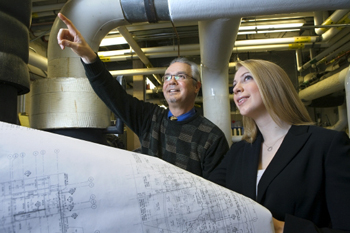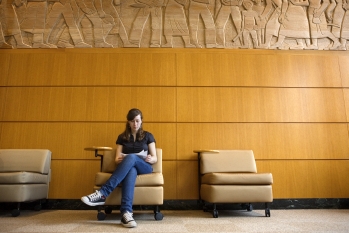COVER STORY
Undergrads seek to change the world through research
(Page 2 of 6)
Jeanette Abate '09 is conducting research in the Hotel School for her honors thesis on LEED-certified buildings and the linkages between LEED certification and the rents and valuation of the building. Here, she tours the basement of Statler Hall with Jan deRoos, Hotel School associate professor, with building blueprints.See larger image
The concept of involving undergraduates in original research, from science to the humanities, has been gaining support from educators across the country in recent years. Much of the focus stems from a 1998 report resulting from a three-year study by the Boyer Commission on Educating Undergraduates in the Research University. Funded by the Carnegie Foundation for the Advancement of Teaching, the report took a critical look at the state of undergraduate education at U.S. research universities and argued for a new approach to include undergraduates in every aspect of the research life of the institution.
"There needs to be a symbiotic relationship between all the participants in university learning that will provide a new kind of undergraduate experience available only at research institutions," the authors wrote. The researchers would be stimulated by the creativity and energy of undergraduates, while graduate students would benefit from integrating their research and teaching experiences.
A question of funding
Since the 1950s, a major source of funding, both of undergraduate research and research by faculty who work with undergraduates, is the National Science Foundation. The agency currently spends about $55 million annually supporting undergraduate research, with some of that support going to the summer Research Experiences for Undergraduates program, the rest to other year-round projects.
"A lot of studies have shown that research experiences are one of the best tools for recruiting students into science careers and retaining them," says Corby Ellis, REU coordinator at NSF.

Jane Olin-Ammentorp '09 is a Rawlings Presidential Research Scholar whose research looks, in part, at the role public art and graffiti play on the West Bank barrier. See larger image
Funding also is available from a wide variety of other sources, says Peter Lepage, dean of Cornell's College of Arts and Sciences. "In the sciences there is considerable support from federal funding agencies who appreciate the importance for science of involving undergraduates in real research," Lepage says. "We also rely upon donor support, which is essential for research areas that are not supported by funding agencies."
He adds, "The increased amount of undergraduate research taking place is one of the more significant changes in undergraduate education over the past few decades."